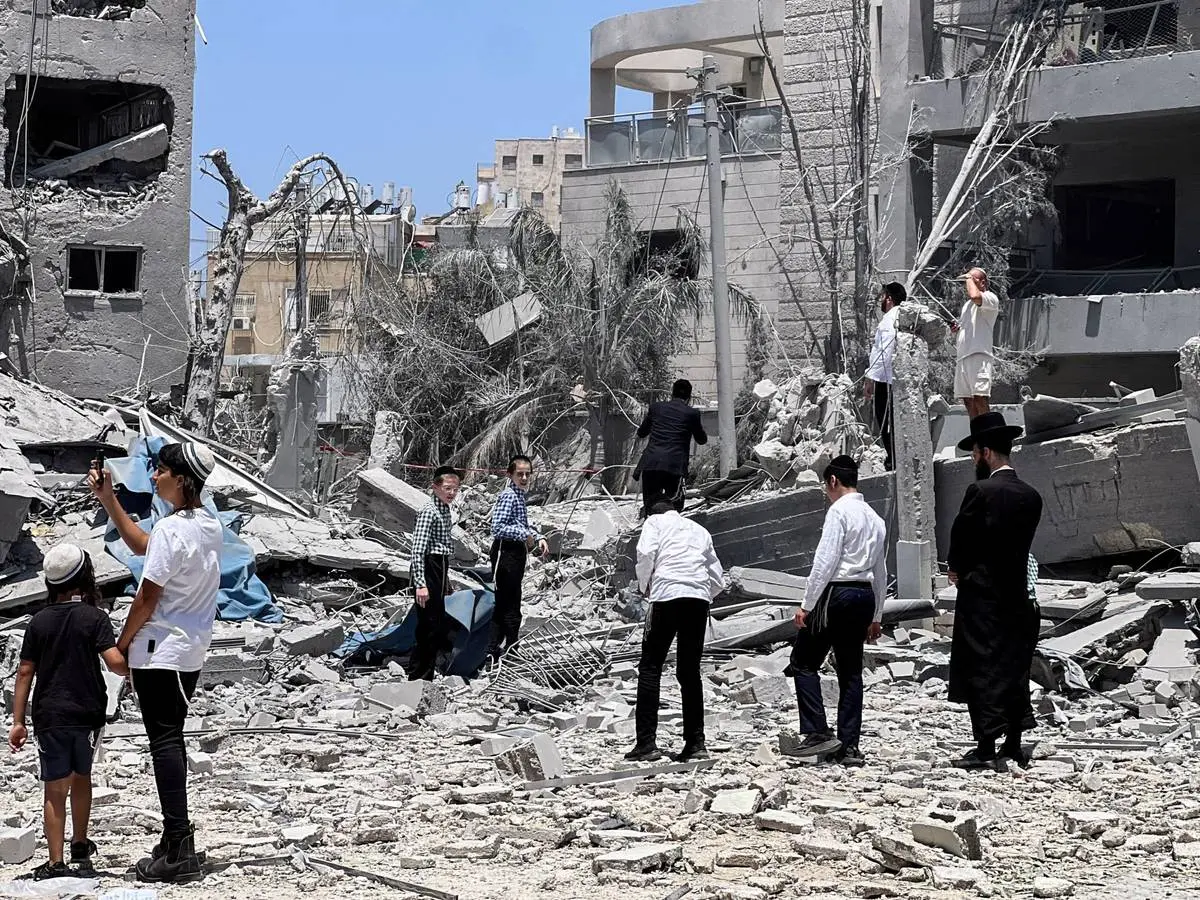Alwaght- Just contrary to the claim of victory by the Israeli Prime Minister Benjamin Netanyahu in the 12-day war with Iran, field realities and far-reaching consequences of this conflict show that this war has imposed heavy costs on the Israeli society. This multi-faceted crisis is not limited to the military aspect and has inflicted human casualties, as well as economic and social damages and gaps on the Israeli regime. Some observers suggest that rebuilding confidence and reforming the political and economic structures to move past this predicament takes long time and strenuous efforts.
Israeli military defeat against Iran
The Israeli-Iranian war represented a determining point in assessing the defense and strategic capabilities of the Israeli regime. It was a war that was claimed by Netanyahu to be a "successful deterrence", but in practice it gave rise to a different reality, showing that the Israeli infrastructures are vulnerable. The war actually shattered the legend of invincibility of Israel.
The inability of the Israeli regime’s advanced defense systems, including Iron Dome, David’s Sling, and Arrow, to intercept a significant number of Iranian missiles and drones not only questioned the effectiveness of these much-vaunted, costly systems but also once again demonstrated the strategic weakness and vulnerability of the Israeli regime’s military infrastructure to massive and precise attacks.
In this battle, more than 550 Iranian ballistic missiles were fired at vital Israeli military installations along with hundreds of drones. Although the multi-layered defense systems were able to repel some of the attacks, several key military bases of the regime were directly hit.
The Navatim base, one of the most important air force bases where advanced F-35 fighters are stationed, was targeted by several missiles. Satellite images and reports from external sources confirmed damage to the base’s maintenance sheds, taxiways, and administrative buildings. Sources close to Iran reported that 5 to 9 missiles hit the base.
The Hatzerim base, home to the F-15 squadrons, was also damaged and taken temporarily out of service. The Kirya building in Tel Aviv, which is the headquarters of the army and intelligence agencies and the venue for security meetings of the small Israeli cabinet and government security meetings, did not survive the attacks. One of the missiles hit near this complex, causing damage to its logistics section.
Sensitive military communications centers and buildings related to Mossad and AMAN were also targeted. Although the Israeli army claimed that no fighter jets were shot down and that the systems remained operational, the very penetration of missiles and destruction removed the mask of "absolute security" from the face of the Israeli army.
Striking and destroying the Weizmann Institute of Science dealt a working blow to the Israeli scientific and defense tech technology infrastructure, bearing the potential to seriously disrupt Israeli advanced weapons and long-term security.
Therefore, this war showed that Israel's military costs are not limited to physical casualties, but rather the decline in deterrence, the exposure of defense gaps, and the need for extensive reconstruction of military infrastructure are long-term and strategic costs that Tel Aviv has to pay.
Economic damages
The recent war was not just a military confrontation, rather, it was a scene of exposure of Israeli economic fragility. What Tel Aviv was expecting to be a limited and deterrent clash turned into a comprehensive crisis hitting Israeli economic structure.
According to the New Arab news outlet and Israeli economic sources, the direct economic damage from the war is estimated at $12 billion. This amount includes military costs, damage from Iranian missile attacks, compensation to businesses, the cost of rebuilding damaged infrastructure, and the widespread shutdown of business activities. Some Israeli economists have warned that the continuation of the conflict could lead to the complete collapse of the regime’s economy.
The Israeli Ministry of Finance has confirmed a loss of 22 billion shekels (about $6.46 billion), and the army has submitted a budget request of 40 billion shekels ($11.7 billion) to compensate for weapons damage and restore defense systems. This is while the estimate of the damage to damaged residential and commercial properties is not yet complete and is estimated at between $294 million-$440 million.
According to a report published by the Knesset Finance Committee, about 40,000 claims for compensation have been filed and are expected to reach 50,000. More than 3,700 vehicles were also damaged in the war, and their owners have filed for compensation.
Reuters reported that the amount of damages Israel suffered was twice the losses it suffered during its 21-month war with Gaza.
On the other hand, increase of the budget deficit to 6 percent and drop in the business activities nearly 0.2 percent are other direct consequences of the recent war. A source at the finance ministry said that Tel Aviv may request for aid from the US to cover the war damages.
In addition to the financial crisis, the stock market also took a huge hit. The Tel Aviv Stock Exchange Index fell by 18 percent, leading to an outflow of $6.4 billion in foreign capital. Israeli technology companies such as Check Point and Wix also saw their shares falling by 12-25 percent.
Another blow came to the port of Haifa, where Iranian missile attacks shut down port operations for at least 10 days, disrupting exports and imports, especially in the technology and pharmaceutical sectors. The tourism sector, which accounts for 7 percent of Tel Aviv’s GDP, was also completely paralyzed. The cancellation of more than 80,000 flights and the suspension of international airlines such as Lufthansa and Emirates cost the sector $1.2 billion.
Analysts at the RAND Corporation have warned that if the conflict continues, Israel could face a two-year recession and the unemployment rate could rise to more than 9 percent. Ultimately, rebuilding the damage will require a budget equivalent to 15 percent of GDP, a figure that has been described as unprecedented compared to previous wars.
With that said, the war with Iran was not only militarily futile but also economically disastrous for Tel Aviv, which relied on its financial and technological power and is now facing a structural crisis, a crisis that no missile defense system can contain.
Political losses
War with Iran not only in military and economic terms has been costly to the Israeli regime, but also in politics and diplomacy there was a deep loss. Just contrary to the media propaganda of the Tel Aviv leaders about military success, the field reality and international reactions to the war talk about serious damage to the Israeli image among public opinion and international political circles.
Regionally, West Asian nations condemned the Israeli aggression and voiced support to Tehran for its legitimate right to self-defense. At the same time, widespread demonstrations were held in Arab and Muslim countries from North Africa to the Persian Gulf against Tel Aviv's aggression, showing that the Israeli regime's soft power in the region is collapsing more and more, which could put a long-term pause in the process of normalizing relations with the Arabs.
Protests also were arranged in Europe, and rallies against Tel Aviv's actions were held in European capitals, including London, Paris, Berlin, and Rome. Thousands of people also took to the streets in the US, and it is noteworthy that Jewish groups joined these protests, issuing a statement condemning Tel Aviv's attacks and calling for an immediate end to the war.
In addition to public pressure, international diplomatic institutions also criticized the Israeli regime's aggressive policies, to the point that the European Union put a new sanctions package on the table to stop Tel Aviv's war machine in the region. The package is to be approved if the Netanyahu cabinet's warmongering continues.
These pressures show that the war with Iran was a complete political defeat for Tel Aviv, and that, contrary to initial calculations, the regime not only failed to achieve a political victory, but also weakened its diplomatic position and put Tel Aviv further into a political isolation, a reality that even its long-standing allies cannot close eyes to.
Social losses
Though the war was short, its social fallouts are heavy and deep for the Israeli society. Just contrary to the claims by the Israeli officials about successfully managing the crisis, reactions of the settlers showed that this war more than anything divided the Israeli society.
Millions of citizens had to hide for long hours in shelters on a daily basis. This recurrent experience built heavy pressures on the society and created a broad gap between the government and the public. Sense of insecurity and distrust in the crisis handling has left many Israelis blame Netanyahu for the current crisis.
A post-war survey by the Israel Democracy Institute (IDI) revealed significant figures that reflect this social failure. Only 38 percent of settlers trusted the government’s handling of the war, down from 72 percent before the conflict, indicating a sharp decline in widespread dissatisfaction with the political leadership, especially Netanyahu’s decisions and crisis management.
On the other hand, former Tel Aviv officials have openly admitted that the volume of Iranian missile and drone attacks has completely disrupted the security equation and removed the regime from its position of military superiority, to the point that they believe that the outcome of the war spelled a bitter fate for the occupied territories.
A poll by Ma'ariv has the same thing, with twi-third of the Israelis believing that they lost the war to Iran. Also Kan news network reported that 55 percent of the settlers still fill the threat from Iran, something showing that sense of insecurity has become a permanent challenge to the Israeli public opinion.
In general, this war not only has failed to rebuild Israeli deterrence power, but has also subjected the Israeli society to deep social gaps, mental exhaustion, and downturn in political legitimacy. So, the consequences of this loss to Iran can be far more lasting and costly than its military losses.



























